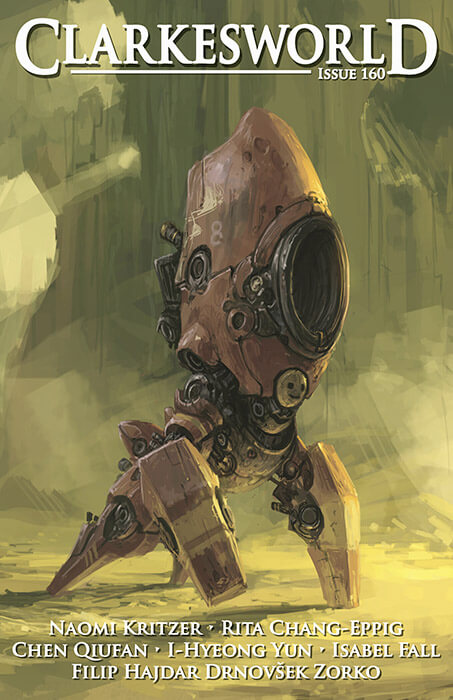Having covered all six finalists for Best Short Story, WWAC’s coverage of the Hugo Awards now moves on to the Best Novelette category, starting with A. T. Greenblatt’s “Burn or The Episodic Life of Sam Wells as a Super” and Isabel Fall’s “Helicopter Story” (formerly titled “I Sexually Identify as an Attack Helicopter”).
“Burn or The Episodic Life of Sam Wells as a Super” by A. T. Greenblatt
Sam Wells has a superpower, but he is not exactly a superhero. His ability to spontaneously create flames does not impress the superhero team he auditions to join, not when its only accomplishment is to ignite his hair. He is eventually given a role in the team, one that he is assured is vital to its success: the accountant.
In the grand tradition of superhero parodies, one of the oldest jokes is the embarrassing audition in which various no-hopers line up to display their useless powers. When “Burn or The Episodic Life of Sam Wells as a Super” takes this old saw as its opening sequence, it explores not just the humour but also the pathos inherent in the premise. With no cameras to smile for, a team of city-saving superheroes are reduced to a group of sullen, slouching panellists; and rather than the butt of a joke, the person performing the audition becomes a character relatable to anyone who has taken part in a disastrous job interview.
This is a story that scrapes away the fantastical surface of the superhero genre to see what lies beneath, not in the service of grim deconstruction (as per so many post-Watchmen works) but out of an interest in the everyday workings of the mundane world. It is telling that, while the X-Men mythos has its mutants typically manifest their powers as teenagers, A. T. Greenblatt’s story establishes that a superperson will develop abilities during their mid-to-late twenties: the romance of adolescent rebellion is replaced with the disillusionment of adulthood.
Throughout the novelette, the conventional high-flying superhero adventures are kept at arms’ length while we are shown a decidedly unglamorous corner of the superworld. Protagonist Sam became the unwilling star of a viral video in which he spontaneously combusted in a jazz bar. This was enough for him to be invited to the local superhero team by Miranda: as team coordinator, PR/HR head and office manager, she gets a number of key duties that are carried out away from the cameras and without a shred of spandex. We also meet Danielle, a “small, wizened woman in fading clothes and work gloves” who acts as building manager and repairwoman (and, according to Miranda, sanity check).
At one point, when a more media-friendly superhero asks Sam what he wants, we are given a flatly honest account of his mental state:
Sam wants a martini and to go back to bed. He wants to have real furniture in his apartment and hair on his head and for people to stop being afraid of his “special ability.” He wants to stop being afraid of it himself. If Sam were narrating his own story he’d want it to start “Watch Sam save the day” like the Supers on the news. Or “Watch Sam use his ability for good.” Or even “Watch Sam the Super reconcile with his friends and loved ones.” Anything would be better than just watching Sam burn.
The story does not entirely remove the element of wish-fulfilment fantasy from its genre. Miranda turns out to have the novel ability to form small tornados from shards of broken glass, a useful trick when dealing with bigots (as per X-Men, superpowered people are treated with prejudice and suspicion by the general public). Meanwhile, when the city is faced with the threat of a distortion in the space-time continuum that causes havoc by sucking objects and potentially people into wells of nothingness (“So this is what breaks in reality look like? Sam thinks. Now he wishes he didn’t know”) the superheroes are on hand to save the day.
Except, that is, when they are not. The rescue mission ends with collateral damage in the form of a screaming teenager pinned under a vehicle, a spectacle that continues to haunt Sam as a reminder of all that can go wrong in the superhero business.
The title’s reference to an episodic life has multiple meanings. Most obviously it refers to the structure of the story, which is split into episodes – some emphasising fantasy aspects, others rooted firmly in the mundane. It also touches upon the theme of behind-the-scenes paperwork: we are told that the superhero team’s solvency is “episodic, unpredictable, in direct correlation to public popularity”. Another meaning is psychological: “I’m trying to control the episodes, really” says Miranda after accidentally smashing a glass with her powers.
It is the psychological angle that comes to dominate the story. With the space-time disruptions dealt with off-page, the climax focuses upon the main character’s internal conflict:
No, Sam’s here because of his friends and coworkers, who haven’t called since that night in the bar. Who didn’t stop by or write him an email during that entire month afterwards when he was too scared to leave his apartment. Sam joined the Super Team so he could look in the mirror again and see more than what he’s lost.
Sam’s doubts – intensified by a superhero colleague who can see snapshots of the future – battle against his sincere desire to be a hero. A more typical superhero story would find some way to symbolise this with an external fight sequence, but “Burn or The Episodic Life of Sam Wells as a Super” does a thorough enough job of developing its protagonist to make the final confrontation rather more subtle than that.
“Helicopter Story” by Isabel Fall
Here we have the story that was originally published as “I Sexually Identify as an Attack Helicopter”. The (transgender) author’s decision to use what was originally joke at the expense of trans people as a writing prompt kicked off an online storm, as self-righteous commentators queued up to denounce the story – and in the process, as a Vox.com article revealed earlier this year, contributed to Isabel Fall checking into a psychiatric ward with thoughts of suicide.
The novelette at the core of this frankly shameful affair depicts a dystopian America wracked by civil war, as the military-industrial complex flexes its metallic muscles against various targets scattered across a desertified landscape. Narrating the saga is Barb, a human-helicopter cyborg who was specifically reconstructed to carry out dirty work for the US government. Following a structure laid out by Robert A. Heinlein in Starship Troopers, the story uses its central conflict as a framing device for two past-tense narratives.
One of these is the history of the civil war: the story drips with satire as we read of “the United States of America’s war against the Pear Mesa Budget Committee.” The other strand is Barb’s personal backstory, which details their struggles with gender identity. It is the latter plot thread that contains the true soul of the story. The ruminations on womanhood – including the dress, behaviour and social roles that are expected to come with it – are used to articulate the workings of Barb’s cyborg body. With one breath, the story removes the dust from the cyberpunk genre, and cold, hard body parts take on a new life through a network of gender-based metaphors:
I remember being a woman. I remember it the way you remember that old, beloved hobby you left behind. Woman felt like my prom dress, polyester satin smoothed between little hand and little hip. Woman felt like a little tic of the lips when I was interrupted, or like teasing out the mood my boyfriend wouldn’t explain. Like remembering his mom’s birthday for him, or giving him a list of things to buy at the store, when he wanted to be better about groceries.
I was always aware of being small: aware that people could hurt me. I spent a lot of time thinking about things that had happened right before something awful. I would look around me and ask myself, are the same things happening now? Women live in cross-reference. It is harder work than we know.
Now I think about being small as an advantage for nape-of-earth maneuvers and pop-up guided missile attacks. Now I yield to speed walkers in the hall like I need to avoid fouling my rotors. Now walking beneath high-tension power lines makes me feel the way that a cis man would feel if he strutted down the street in a miniskirt and heels.
I’m comfortable in open spaces but only if there’s terrain to break it up. I hate conversations I haven’t started; I interrupt shamelessly so that I can make my point and leave. People treat me like I’m dangerous, like I could hurt them if I wanted to. They want me protected and watched over. They bring me water and ask how I’m doing. People want me on their team. They want what I can do.
The story’s broad satire of militarism and its up-close-and-personal analysis of gender identity exist on very different wavelengths, and yet they are united by the end. A major part of the worldbuilding is taken up by the military weaponising newfound acceptance of transgender people for its own brutal purposes – a dire warning about the misuse of social gain. More directly, Barb’s descriptions of machine-gender dynamics become increasingly graphic, climaxing (in more ways than one) with a memorable scene of war-sex between Barb and their cyborg co-pilot Axis:
Of course I fuck Axis. A few decades ago this would’ve been a crime. What a waste of perfectly useful behavior. What a waste of that lean muscled form and those perfect killing hands that know me millimeter-by-millimeter system-by-system so there is no mystique between us. No “secret places” or “feminine mysteries,” only the tortuously exact technical exercise of nerves and pressure. Oxytocin released, to flow between us, by the press of knuckles in my cunt.
When I come beneath Axis I cry out, I press my body close, I want that utter loss of control that I feel nowhere else. Heartbeat in arched throat: nipple beneath straining tongue. And my mind is hyper-activated, free-associating, and as Axis works in me I see the work we do together. I see puffs of thirty-millimeter autocannon detonating on night-cold desert floor. Violence doesn’t get me off. But getting off makes me revel in who I am: and I am violent, made for violence, alive in the fight.
Throughout all of this, Isabel Fall’s story remains so tightly-packed that almost every paragraph contains at least one sparkling piece of word-craft, whether the topic is warfare or gender. That so much of the discourse surrounding the story focused solely on its title surely constitutes a crime against reading comprehension.
All too often with works of provocative or transgressive media, controversy comes to replace substance. This is not the case here. We may call it “Helicopter Story” or we may call it “I Sexually Identify as an Attack Helicopter”, but either way this is an award-worthy piece of contemporary science fiction.



